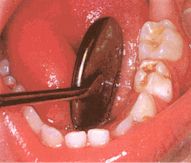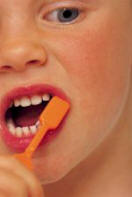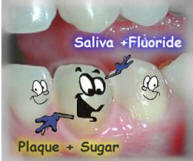The Department of Health is concerned about the health of our children’s
mouths. Why is that?
 Our experience from visits by children at the dental clinics, and findings
of the studies we conduct inform us that there are a lot of children who
experience tooth decay, which is a condition that can be prevented. In most
parts of the country, children experience tooth decay, and in some instances
decay of the whole set of teeth, which make them unable to eat properly.
Children with tooth decay lose school days due to pain, discomfort and
visits to dental clinics for treatment.
Our experience from visits by children at the dental clinics, and findings
of the studies we conduct inform us that there are a lot of children who
experience tooth decay, which is a condition that can be prevented. In most
parts of the country, children experience tooth decay, and in some instances
decay of the whole set of teeth, which make them unable to eat properly.
Children with tooth decay lose school days due to pain, discomfort and
visits to dental clinics for treatment.
What could be causing tooth decay in children?
Tooth decay in children is related to their feeding. Children found to have
a lot of dental decay are
found to be those that are fed a lot of food containing sugar. The most
common causes of early
tooth decay in infants and babies are sweetened and sugary drinks given in
the bottle.
Mothers and caregivers also let babies go to sleep with feeding bottles in
their mouths, which is
very bad for children’s teeth. The milk or the sweetened drink in the bottle
is turned into acid by the
germs in the mouth, and this acid then attacks the enamel of the teeth,
leading to tooth decay.
Foods like cakes, sweets, ice cream and other drinks containing sugar also
contribute to tooth
decay, especially if eaten right through the day, instead of during meals
only.
What advice can be given to parents and caregivers about the right food for babies to help them prevent tooth decay?
Good eating habits for children should start as soon as they are born. First
of all, the
Department encourages breast feeding for children, especially if the mother
is healthy to do
so. However, if mothers cannot breastfeed their babies, they must make sure
to prepare bottle feeds correctly to ensure that the babies get the right amount of
milk. It is important
that mothers or caregivers do not let babies go to sleep with bottles in
their mouths.
Babies and infants should also be given nutritious food to help them grow
and to prevent diseases, including oral diseases.
It is not easy to deprive children of sweet things completely, but the more
often the sweet and sugary foods are eaten the more harm they will do to the
teeth. It is therefore better that these sugary foods are eaten during
mealtimes, and not right through the day. Children can be taught to develop
a taste for healthy foods. For example, for snacking during the day,
children can be given fruit or other food like potato chips.
How soon should children start brushing their teeth?
 When a child is still without teeth or is less than a year old, parents can
use a piece of cotton wool or clean cloth to wipe the mouth clean. When a
child is a year old, a small toothbrush made for children can be used. At
this stage, warm water can be used to brush the teeth to let the child get
used to brushing.
When a child is still without teeth or is less than a year old, parents can
use a piece of cotton wool or clean cloth to wipe the mouth clean. When a
child is a year old, a small toothbrush made for children can be used. At
this stage, warm water can be used to brush the teeth to let the child get
used to brushing.
As soon as the child gets used to brushing, toothpaste containing fluoride
can be introduced; use a small amount of toothpaste, the size of a pea.
Brushing should be done at least twice a day, particularly during bathing,
so that children can develop a habit of washing their bodies and brushing
their teeth.
Why is brushing of the teeth so important?
Brushing removes the plaque. Plaque which contains germs, sticks to the
teeth in the area close to the gums, and in grooves on the biting side of
the teeth at the back of the mouth. The germs with sugar will cause tooth
decay and gum disease, if not removed. Therefore brushing the teeth prevents
gum disease and tooth decay.
You mentioned a fluoride containing toothpaste. Why should toothpaste contain fluoride?
The fluoride in the toothpaste helps to fight against tooth decay by
strengthening the outer layer of the teeth, called enamel. This strengthened
enamel is able to withstand the acid formed by germs and sugar in the mouth.
What other advice do you have for caregivers and parents, regarding the care of their children’s teeth?
Parents and caregivers should have children’s teeth checked regularly, at
least twice a year, before problems start. This enables oral health care
workers to detect oral health problems, especially tooth decay at an early
stage, when it can still be treated and stopped, and thereby prevent the
loss of teeth.
Taking children for dental check-ups also helps children to get used to
visiting oral health workers.
When taking children to the clinic for a health check up or immunizations
(routine injections), make sure you also take them for their dental
check-up.
In conclusion, what can you tell our parents and caregivers?
Parents and care givers must please remember the following important things:
- Give children a variety of good food for healthy teeth and mouths.
- Sweet foods and drinks cause tooth decay, especially when taken the whole day.
- Clean children’s teeth from an early age, at least twice a day. In the morning and at night.
- Use fluoride toothpaste to clean children’s teeth- it prevents tooth decay.
- Have children’s teeth checked regularly- at least twice a year.
- Most importantly, this advice is also good for the whole family.
 Our experience from visits by children at the dental clinics, and findings
of the studies we conduct inform us that there are a lot of children who
experience tooth decay, which is a condition that can be prevented. In most
parts of the country, children experience tooth decay, and in some instances
decay of the whole set of teeth, which make them unable to eat properly.
Children with tooth decay lose school days due to pain, discomfort and
visits to dental clinics for treatment.
Our experience from visits by children at the dental clinics, and findings
of the studies we conduct inform us that there are a lot of children who
experience tooth decay, which is a condition that can be prevented. In most
parts of the country, children experience tooth decay, and in some instances
decay of the whole set of teeth, which make them unable to eat properly.
Children with tooth decay lose school days due to pain, discomfort and
visits to dental clinics for treatment. When a child is still without teeth or is less than a year old, parents can
use a piece of cotton wool or clean cloth to wipe the mouth clean. When a
child is a year old, a small toothbrush made for children can be used. At
this stage, warm water can be used to brush the teeth to let the child get
used to brushing.
When a child is still without teeth or is less than a year old, parents can
use a piece of cotton wool or clean cloth to wipe the mouth clean. When a
child is a year old, a small toothbrush made for children can be used. At
this stage, warm water can be used to brush the teeth to let the child get
used to brushing.